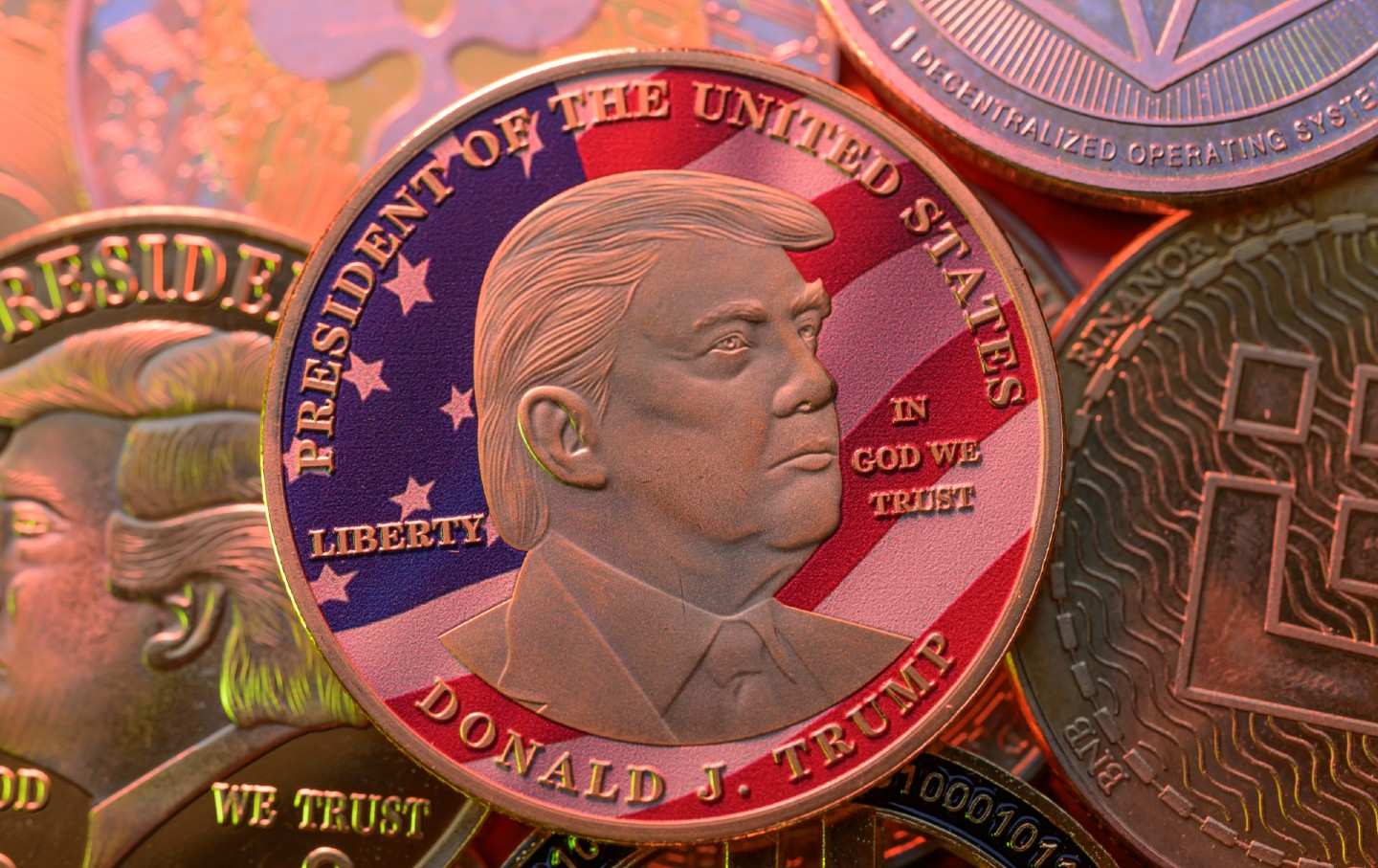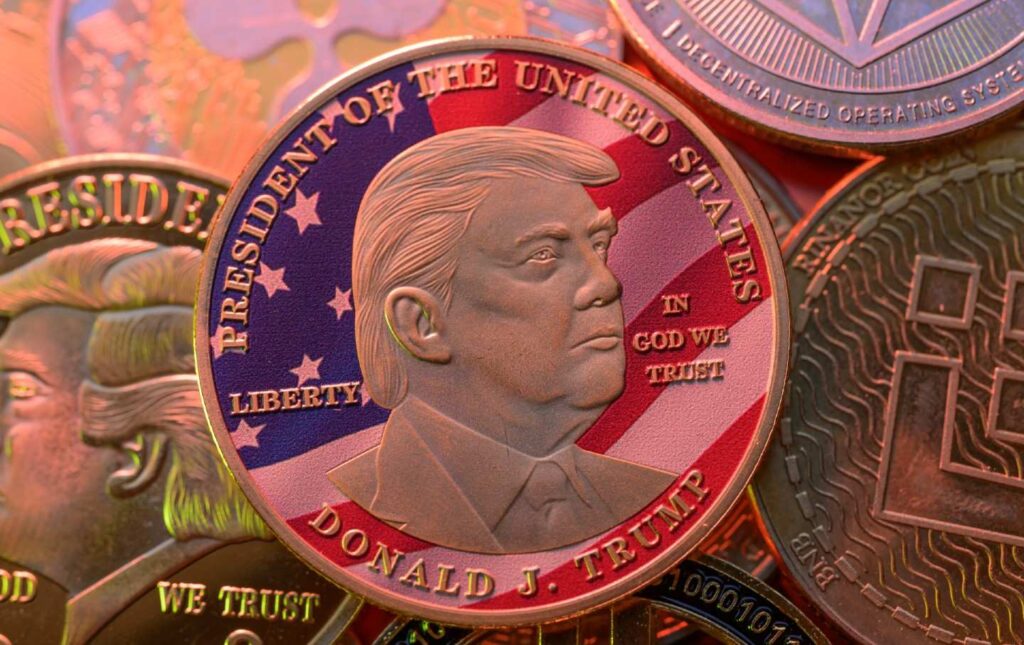May 22, 2025
Why are 16 Democrats abetting this great sting?

Thursday night, as part of his brazen violation of the Constitution and laws that he swore to defend, President Donald Trump is hosting an “intimate dinner” for the 220 largest purchasers of $TRUMP, the memecoin he launched days before taking office. In addition to lining Trump’s pockets, attendees will have much to celebrate. Earlier this week, the Senate—aided and abetted by 16 Democrats—passed the GENIUS Act, a cryptocurrency regulatory act, designed and essentially paid for by the crypto lobby. Together, the dinner and the legislation are milestones on the road to what is likely to be known as the Great Sting, the biggest and most costly con in our history.
In his first term, Trump correctly dismissed crypto as a scam. Crypto has had few uses, beyond speculation and crime—providing a secretive entrepôt for money laundering, tax evasion, and investment scams. It has also had a growing problem with security; it’s estimated that hackers made off with more than $2 billion in 2024.
The industry’s greatest success has been in corrupting politics. In 2024, it was, after Elon Musk, the biggest deep pocket in the election, contributing directly to the defeat of progressives like Senator Sherrod Brown (D-OH) and former representative Katie Porter (D-CA). And of course, to the victory of Donald Trump.
It didn’t take Trump long to realize that crypto was his kind of hustle. Just before taking office, he launched $TRUMP and $MELANIA, memecoins—cryptocurrencies known as “shitcoins” in the industry—because they are backed by nothing and have no value other than in speculation. Trump even disclosed this to his customers, the website stating, “This is not an investment opportunity. You should do this to celebrate me, to celebrate my leadership, my willingness to fight, fight, fight.”
Not surprisingly, the memecoins initially soared in value and then crashed, with Trump’s operation earning millions in transaction fees along the way.
Trump’s memecoin also served essentially as bagman for collecting bribes and payoffs from countries and mostly foreign oligarchs seeking favors. Trump’s guest list for the dinner is still not public, but experts conclude that most of the “wallets” were foreign in origin. One of his biggest purchasers is the infamous Justin Sun, who put $75 million into the pot in two highly publicized purchases. Soon thereafter, the SEC “paused” the fraud investigation into him. Trump has announced that he would release another $800 million in his memecoin over the course of his second term.
Current Issue

Trump’s World Liberty Financial Company has also launched a stablecoin—the USD1. Stablecoins are pegged to the dollar, which is intended to provide them with value. Trump’s stablecoin became another vehicle for those seeking favors, illustrated by a United Arab Emirates backed firm announcing that it would buy $2 billion to use in purchase of the digital currency exchange, Binance. Once more, Trump would pocket millions in fees.
All told, Forbes estimates that Trump pulled in about $290 million in the first months of his presidency. In Trump’s transactional presidency, Qatar’s big, beautiful airplane is merely a sidelight to the real grift.
Big money talks in politics. It buys lobbyists and promoters, pollsters, policy hacks, and politicians. And it buys bipartisan support—and that’s where the true threat lies. Most of this country’s major catastrophes—Vietnam, NAFTA, financial deregulation, Afghanistan, Iraq—have been propelled with bipartisan fervor. And that’s the next stage of the crypto-con.
To gain a patina of legitimacy, the crypto industry wants what Beltway pundits call a “light touch” regulatory framework—one that provides the innocents with a false sense of confidence without interfering with the insiders. Thus, the cryptolobby pushed hard to disarm the cops on the beat, while passing new token regulation. Not surprisingly, they dubbed the latter GENIUS.
Trump immediately took on the first task. He named David Sacks, a man with a speckled history in cryptocurrency, as his “crypto czar,” providing him with an “ethics waiver,” while firing the Senate-confirmed head of the Office of Government Ethics. Paul Atkins, a crypto currency consultant, was confirmed as head of the SEC. Led by the head of the Crypto Task Force, Commissioner Hester Peirce, dubbed the “crypto mom” by industry wags, the SEC has paused or dismissed investigations launched under Biden, while declaiming against “regulation by enforcement.” Musk’s DOGE operation disemboweled the Consumer Financial Protection Agency, which was policing various digital banking schemes. The Justice Department disbanded its national cryptocurrency enforcement unit. Trump Commerce Secretary Howard Lutnick headed Cantor Fitzgerald, essentially the banker of Tether, notorious as the “go to cryptocurrency for international criminals.” Trump announced the creation of a US Cryptocurrency Reserve—with Sacks, his crypto currency czar, heavily invested in the five crypto currencies in the reserve.
The cryptolobby then turned to the Congress to pass its Potemkin Village regulation. The GENIUS Act will require stablecoins to maintain adequate reserves, to adhere to basic rules, and to give priority to investors in case of bankruptcy.
Popular
“swipe left below to view more authors”Swipe →
That’s a joke. The act provides few standards on redeeming the coins, opening the way for imposing high fees or long wait times. Reserves needn’t be backed by private deposit insurance, only by reserves that can include uninsured money market funds, foreign institutions, or uninsured demand deposits. The act exempts the stablecoins from the SEC and makes no provision for the CFPB. And of course, Trump’s crew has dismantled the enforcers.
Senator Elizabeth Warren detailed the shortcomings of the act, concluding that it is “worse than no bill at all.” It passed the Senate on a bipartisan vote of 66–32, with every Republican and 16 Democrats joining in. Those Democrats—Alsobrooks, Blunt, Rochester, Booker, Cortez Masto, Fetterman, Gallego, Gillibrand, Hassan, Heinrich, Lujan, Ossoff, Padilla, Rosen, Schiff, Slotkin, Warner—are complicit in the calamities to come.
The hucksters are free to fleece their marks. Only now there’s a pretense of federal oversight. The peril is apparent. Amazon, Meta, and X and other tech companies can issue their own currencies. As pension funds, state governments, university endowments, and private retirement accounts expand their investments in cryptocurrencies, they do so with a false sense that the federal government is on the beat.
This is a set-up for the greatest pump and dump scam ever. The prices will spiral up—and when they crash, as they inevitably will—the innocent and the insiders, the conners and the conned will demand that the Federal Reserve intervene, and put a floor under the price, make the investors whole. How do we know this is true? Because much of the cryptocurrency crowd—including David Sacks—were caught in the Silicon Valley Bank collapse, with millions of uninsured deposits. For all their supposed free market, macho-anarcho blather, they raised hysterical cries for the Federal Reserve to intervene—which it did, making an exception to its own rules to save their fortunes. What the Senate just did—in the bipartisan folly of every Republican and 16 Democrats—is set the stage for a rerun of that sordid show on a much more grotesque scale.
Robert L. Borosage
Robert L. Borosage is a leading progressive writer and activist.

